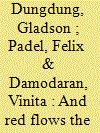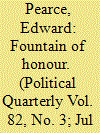|
|
|
Sort Order |
|
|
|
Items / Page
|
|
|
|
|
|
|
| Srl | Item |
| 1 |
ID:
187288


|
|
|
|
|
| Summary/Abstract |
This article documents Adivasi resistance to the ‘loot’ of their land and resources since 1980, especially during the Kalinganagar movement in Odisha, roughly between 2004 and 2010, and the Pathalgadi movement in Jharkhand, between 2016 and 2018. Using the lens of trauma and testimony, the article represents a combined effort by Gladson Dungdung, an Adivasi activist, journalist, and writer who has borne witness to events during these years; Felix Padel, an anthropologist; and Vinita Damodaran, a historian. The land grabs are mainly oriented towards mining and metals production, justified in terms of ‘development’, which leaves many dead and destroys landscapes that Adivasis have cared about for countless generations.
|
|
|
|
|
|
|
|
|
|
|
|
|
|
|
|
| 2 |
ID:
107212


|
|
|
|
|
| Publication |
2011.
|
| Summary/Abstract |
Pearce argues that honours do not deserve the earnest linguistic toil of the virtuous PAC. Starting with the peers, he observes that when William the Conqueror/Bastard distributed land stolen with violence to his armed band, it was the simple loot from which ancient chivalry, honour and nobility flows. Such lords developed under the more civilised early Whigs, like Walpole, into rent for sending steady support from owned boroughs into the Commons. Witness Bubb Dodington and his three and a half seats in Weymouth, made a Viscount in the name of one of its suburbs.
Harold Macmillan would sack a minister with the wheedling consolation 'A Little something to wear under your tie'. By inventing the Life Peerage, he helped the slow subversion of elected government by creating unelected, often powerful ministers with no relationship to country or people, candid nominees of the National Leader. The one virtue of the post-Macmillan upper house lies in the disloyal, which is say minimally or not all party-attached people of talent reliably voting against ministerial requirements. As for the insignia of all honours, their bars, discs and ribbons are kept on cards in Palace drawers like so much paste jewellery.
|
|
|
|
|
|
|
|
|
|
|
|
|
|
|
|
| 3 |
ID:
172225


|
|
|
|
|
| Summary/Abstract |
This article traces the fortunes of one of India’s great libraries, which Tipu Sultan of Mysore amassed largely through plunder and which the British East India Company plundered in turn. It shows how Tipu used the library to legitimise his authority and how rival factions of the Company, after defeating him in 1799, did the same. The article links the figuration of loot in the subcontinent, as studied by historians of material culture, to the conceptualisation of British India, as studied by historians of political thought. More broadly, it attests the symbolic power that plunder had—perhaps still has—to confer prestige.
|
|
|
|
|
|
|
|
|
|
|
|
|
|
|
|
|
|
|
|
|